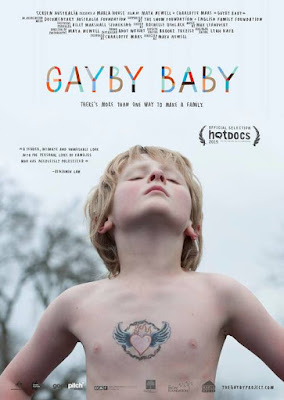 Filmmaker Maya Newell has followed her successful Australian TV series ‘Growing Up Gayby’ with this new full length documentary that takes a look at the lives of four different children whose parents all happen to be gay. It is evidently a subject that is dear to her heart having grown up with two mothers herself. The timing could not have been more perfect as the Australian Government are currently coming under pressure for still refusing to even tackle the whole subject of legalising same-sex marriage, thus continuing to deny these families the legal recognition they need and deserve.
Filmmaker Maya Newell has followed her successful Australian TV series ‘Growing Up Gayby’ with this new full length documentary that takes a look at the lives of four different children whose parents all happen to be gay. It is evidently a subject that is dear to her heart having grown up with two mothers herself. The timing could not have been more perfect as the Australian Government are currently coming under pressure for still refusing to even tackle the whole subject of legalising same-sex marriage, thus continuing to deny these families the legal recognition they need and deserve. Ebony is about to move up into High School and is auditioning to be accepted into the local School for Performing Arts which not only suits her ambitions, but where she think her situation of having two lesbian mothers will be no big issue. Her younger brother has severe epilepsy and needs constant attention which means that neither of the mothers can work full time. They get by on some occasionally hairdressing jobs which puts a financial strain on the family and their old car in particular which is always breaking down.
Like all the other children featured in this movie, Ebony shows a remarkable maturity for such a young head, and at the end of the film she is far less concerned with how tolerant her new classmates will be about her family and defiantly says ‘ if they have a problem with it, they’re not worth it.’
 When Graham was adopted by his two dads he couldn’t even speak as a result of extreme neglect from his birth family. Even with his learning disabilities he is an irrepressible cheerful and bright young boy, and when the family locate to a rather homophobic Fiji because of work, he takes on board the need to be discreet about his home life. His dads explain that ‘Fiji is not keen on gay people’ and so whilst they are there, one will be Dad, and the other their ‘carer’. The dads do however risk sharing the truth with Graham’s teacher who not only takes the whole situation on board but happily volunteers to give Graham some private tutoring to help him catch up with his classmates.
When Graham was adopted by his two dads he couldn’t even speak as a result of extreme neglect from his birth family. Even with his learning disabilities he is an irrepressible cheerful and bright young boy, and when the family locate to a rather homophobic Fiji because of work, he takes on board the need to be discreet about his home life. His dads explain that ‘Fiji is not keen on gay people’ and so whilst they are there, one will be Dad, and the other their ‘carer’. The dads do however risk sharing the truth with Graham’s teacher who not only takes the whole situation on board but happily volunteers to give Graham some private tutoring to help him catch up with his classmates.
He shows an indomitable spirit and it is so easy to see how he, and his older brother, bloom now that they are in a safe home with two parents that love them so unreservedly. To his Dads, Graham’s present disadvantage is no reason to love him any less or any more than any other child, but their willingness to give him a real family and a home when his birth family couldn’t/wouldn’t speaks volumes.
If there was thing lacking in Newell’s excellent documentary then it would be the scant regard she gave to the parents themselves who we learn very little about. It would have also been interesting to know a little more about the children’s back stories too.
Newell ends the movie when all of the families are at the madly extravagant Gay Pride Parade in Sydney. It’s the perfect place to celebrate being gay and being a family too. It may not want to make you want to become a parent, but it will most certainly raise your respect for all the gay people who do.


